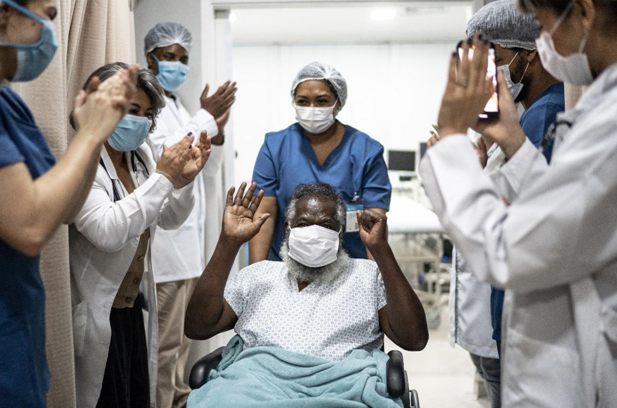Nurses On the Frontline in the War Against COVID-19
The COVID-19 pandemic overwhelmed just about every healthcare system across the world. No one was prepared for how fast it would spread and how severe the illness would be. Hospitals didn’t have enough resources, and the experts had no idea how to treat it.
Through it all, the nurses were heroes. They not only did their jobs, but many did more than was required. They worked with limited resources and put in extra shifts, tirelessly delivering care to those who needed it. It served to highlight just how important nurses are to the healthcare system. Without them, it would all likely have broken down.
Table of Contents
The Critical Role Played by Nurses During the COVID-19 Pandemic
Nurses played a critical role in patient care, helping with admissions, triage, testing, and treatment. They also played a vital part in managing medical supplies, making sure that whatever hospitals had at their disposal was used as efficiently as possible.
They helped enforce sanitation in different ways. They made sure that hospital wards were properly sterilized and that the sick didn’t come into contact with the healthy. Nurses did their best to ensure that they were properly equipped to minimize the risk of transmission between patients.
Many also took it upon themselves to educate the public on how best to stay safe and what they should do in case they developed symptoms.
It’s worth taking a closer look at what these roles looked like as the pandemic unfolded.
They Took Up Multiple Roles in the Workplace
As the number of COVID-19 patients rose, many nurses realized that to provide the expected duty of care, they needed to do more than was required in their job description.
From departments across the hospital, they came to the ER to help with admissions and to COVID wards to help with patient care. In some places, they provided what care they could in emergency rooms.
Some nurses would go out in ambulances to assist overwhelmed EMTs. In some cases, they went into homes and attended to patients there because there were no more beds in hospitals. Nurses from all departments and all specialties worked together to try and meet the unique challenges that the pandemic presented.
Nurses Helped Manage Resources
One thing that became obvious at the beginning of the pandemic was that there were not enough resources to provide adequate care to the infected.
Nurses were on the front lines, and they had to make do with whatever resources they had. Whether it was medicine, equipment, technology or basic protective equipment, it was the job of the nurse to make sure that they used what they had as efficiently as possible without putting themselves and their patients at risk.
They Spearheaded Awareness Campaigns
As soon as it was understood how COVID-19 was spreading through populations, nurses took up the role of ensuring that the public understood how to stay safe. In hospitals across America and all over the world, they talked to those they came in contact with to make sure they understood the value of social distancing, wearing masks and hand-washing.
In every city and hospital where committees were created to educate the public, the input from nurses was highly valued. Of all health professionals, they have the most contact with patients and are in a position to provide unique insights.
Nurses Were Involved in Policy-Making
Very quickly, governments and healthcare agencies realized that they didn’t have policies in place to effectively deal with a deadly and fast-moving pandemic.
Nurses were among the professionals they relied on to come up with new policies. They are patient advocates, and their expertise, combined with their knowledge of real-life patients, puts them in a unique position to create effective policies.
How Did the Pandemic Affect the Future of Nursing?
Although things have gone back to normal, the pandemic helped redefine nursing in some ways. Today’s nurse is aware and prepared to deal with another pandemic should it occur. They are ready not just for the physical strain of working almost non-stop but also the psychological implications that come with that.
In many healthcare facilities, there are now policies in place to guide decision-making in the event of another crisis. Nurses have a playbook, and hopefully, they can use it to deliver high-quality patient care right from the start.
How Easy is it to Join the Nursing Profession After the Pandemic?
Inspired by what they saw, read, and experienced during the pandemic, some people decided to change careers and join the nursing profession. Some opted to become nurses because they were laid off from their jobs; others chose to switch careers so they could contribute to their communities. Some want to start over in a profession that allows them to feel more satisfied and inspired.
Whatever the reason for the change of career, they are now looking for the quickest way to become a nurse.
For those who already have a degree, an online ABSN program is the fastest way to become a nurse. The course is designed to impart the fundamentals of nursing. Students cover topics like foundations of nursing practice, medical and surgical nursing, nursing for older adults and nursing care for children. There is a module that covers the transition from other careers into nursing practice to help students shift seamlessly into their new careers.
They also get clinical hours, where they work in a real hospital or clinic environment to get practical experience. Here, they can observe more experienced nurses at work, learn how different departments function, and even start to experience what it is like to work with actual patients.
If you choose to go back to studying, it is important to be psychologically prepared for the strain that such a move may place on your life. You will be busy, but make sure you set aside time to rest each week. Make sure to get enough sleep every night, and eat a balanced diet that keeps your brain alert.
Conclusion
The COVID-19 pandemic served to show just how important nurses are to the system. They were involved in every aspect of healthcare, and many times they had to work with the most basic equipment and facilities.
If you were touched by the sacrifices that you saw nurses make during the COVID-19 pandemic, you may be considering a career change. This is possible if you enroll in an online ABSN program as the course is designed for transitioning professionals who already have a degree. All course material is delivered online, and a dedicated student can finish the degree in two or three years.







